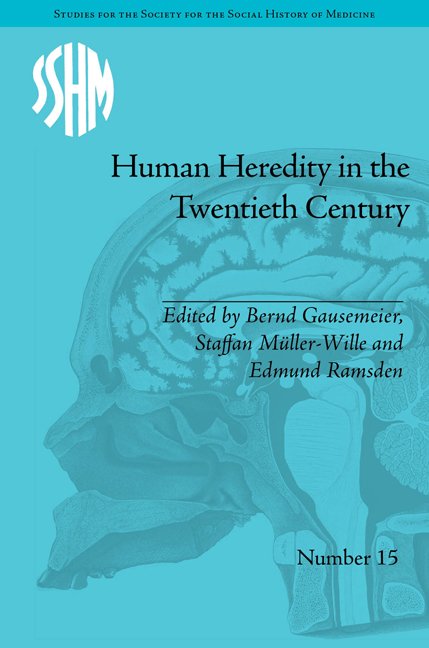Book contents
- Frontmatter
- Contents
- Acknowledgements
- List of Contributors
- List of Figures and Tables
- Introduction: Human Heredity in the Twentieth Century
- Part I Constructing Surveys of Heredity
- 1 Borderlands of Heredity: The Debate about Hereditary Susceptibility to Tuberculosis, 1882–1945
- 2 Championing a US Clinic for Human Heredity: Pre-War Concepts and Post-War Constructs
- 3 Remodelling the Boundaries of Normality: Lionel S. Penrose and Population Surveys of Mental Ability
- Part II Blood and Populations
- Part III Human Heredity in the Laboratory
- Part IV Understanding and Managing Disease
- Part V Reconstructing Discipline(s)
- Notes
- Index
1 - Borderlands of Heredity: The Debate about Hereditary Susceptibility to Tuberculosis, 1882–1945
from Part I - Constructing Surveys of Heredity
- Frontmatter
- Contents
- Acknowledgements
- List of Contributors
- List of Figures and Tables
- Introduction: Human Heredity in the Twentieth Century
- Part I Constructing Surveys of Heredity
- 1 Borderlands of Heredity: The Debate about Hereditary Susceptibility to Tuberculosis, 1882–1945
- 2 Championing a US Clinic for Human Heredity: Pre-War Concepts and Post-War Constructs
- 3 Remodelling the Boundaries of Normality: Lionel S. Penrose and Population Surveys of Mental Ability
- Part II Blood and Populations
- Part III Human Heredity in the Laboratory
- Part IV Understanding and Managing Disease
- Part V Reconstructing Discipline(s)
- Notes
- Index
Summary
In the late nineteenth and the early twentieth centuries, the hereditary susceptibility to tuberculosis (TB) was one of the most discussed topics in the field of human heredity. Remarkably, the complex and substantial debates concerning this topic have left few traces in the historiography of science and medicine. The reason for this neglect probably lies in the fact that these debates generated neither unambiguous results nor a coherent methodology. Historians of human heredity have tended to focus on pioneering studies regarding definitely ‘genetic’ human characters, notably those demonstrating Mendelian inheritance. It has to be noted, however, that almost all of these paradigmatic examples – haemophilia, Huntington's chorea or alkaptanuria – were rare, distinctive anomalies that were clearly endogenous. TB, in contrast, was omnipresent, polymorphic and hardly suited to monocausal interpretations. But precisely because the idea of hereditary susceptibility to the disease was so highly ambiguous and contested, it generated a multiplicity of approaches. And since TB was – unlike most ‘classical’ hereditary diseases – one of the most urgent problems of social hygiene, questions about its aetiology concerned a wide circle of specialists and institutions. For these reasons, a look at the practices that informed the TB debate opens up a wider perspective on the meanings of human heredity.
- Type
- Chapter
- Information
- Human Heredity in the Twentieth Century , pp. 13 - 26Publisher: Pickering & ChattoFirst published in: 2014



